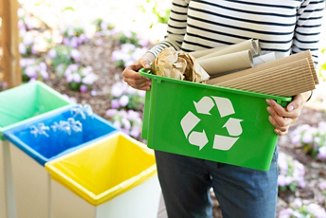Five Tips for Eco-Friendly Summer Gatherings
Planning for a party, whether it’s large or small, can be stressful. You have to send out invitations, think about decorations, lighting, food and beverages, and the hassles of cleanup. With so much to plan, we bet most people don’t think about how straining it can be on the environment too. Here are five tips to plan an eco-friendly party:
1. Invitations: Use e-cards to invite guests as opposed to mailing an invitation. These can be much more fun, and some sites even give you options to customize your invite. Not only are you saving on stamps, but you are saving trees as well by eliminating the need for paper invitations.
2. Dinnerware/Silverware/Decorations: Go for the real thing when serving food and drinks. If doing the dishes is a dreaded part of the day, go disposable with biodegradable cups and plates (remember, try to avoid Styrofoam and plastic products). Use items from your garden to decorate the table and get creative with items that you can upcycle.
3. Lighting: Hold your party or cookout during the day to take advantage of the sunlight. If your party is an evening affair, use candles to create ambience and to save electricity. And if light bulbs are a necessity, go for compact fluorescent or LED bulbs.
4. Outdoor fire pits: Fire pits have become increasingly popular during summer gatherings. Burning wood in outdoor fire pits, such as at a park or campground, is just as bad for air quality as burning wood in a fireplace or wood stove. Burning wood in the backyard eliminates the “smokestack” that normally releases particulate matters and dioxin away from ground level; this results in more direct inhalation of the toxins. Eliminate the urge to light up a fire pit because we all deserve to have healthy air and enjoy the outdoors.
5. Food: Buy local, which reduces the amount of emissions and energy needed to ship food. Also, having a variety of finger foods could reduce the need for plates and dishes. If you must grill, use electric or gas grills. They burn cleaner and more efficiently than charcoal. Charcoal produces particles that can irritate your lungs and contribute to smog and global warming. Be sure to follow community rules regarding safe grilling.



